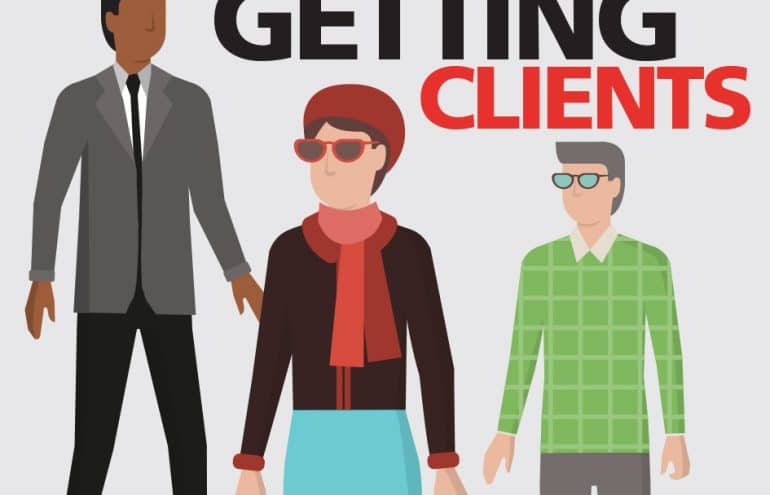
Fitness, according to Merriam-Webster, is “the quality or state of being fit.” So what, then, is “fit”? Therein lies the key to true fitness. As Merriam-Webster explains, “fit” means “sound physically and mentally.” Here are five ways to build true fitness — both physical and mental — into your busy day.
Originally published May 22, 2015
“I’m tired of hearing about ‘improving the client experience.’ People come to me because I do excellent work. They don’t care if I’m nice.” Might sound familiar, but it’s only half right. Your clients expect you to do your job correctly — you’ll hear about it if you don’t. Provided your legal work meets their expectations, it’s the overall experience you provide that they'll remember more. That's what will bring them back, and move them to send their friends to you. Your client’s experience improves when you hit three targets: demonstrate your competence, show respect for your client, and remove as much uncertainty as possible from the process so they feel less anxious (remember, anxious people are cranky people). Here’s the trick, though: You can’t just tell your client that you’re competent, respectful and predictable — you have to show it. To start, focus on three aspects of the client experience: how clients get to your office, the time they spend there and what happens when they leave. ... READ THE REST
Originally published May 21, 2015
An important client texts you for advice on a critical decision, apologizing that circumstances don’t permit a better means of communication. You can’t see or hear each other, and time is of the essence. The decision can’t be deferred. A poor choice may condemn the client to a string of negative consequences. Can you give good counsel solely through short bursts of written words? Remember, hand signals and knowing nods are of no avail. How much does that crimp your style? What do you ask? What do you say? What if you had to write a script in advance to handle the Q&A for such a scenario, to be executed by a bot? Could you possibly anticipate the issues to explore and the points to make, even if you knew exactly what kind of choice the client would be facing? .. READ THE REST
Originally published May 19, 2015
Let’s run down some common misconceptions about social media, and rotate the conversation.

Sometimes women let circumstances and self-imposed obligations get between themselves and their big dreams, says Nancy O'Reilly, editor of the new book, "Leading Women: 20 Influential Women Share Their Secrets to Leadership, Business, and Life." She believes the key to getting all that stuff out of the way is reconnecting with your personal passion. (And that goes for men, too, actually.) But how?
Originally published May 15, 2015
In today’s saturated marketplace of ideas, many law firms struggle to create content that connects with audiences suffering from information overload. Faced with this challenge, legal content creators have three options: give up, trudge on or get strategic. To develop valuable, informative and entertaining content, you need a content strategy that leverages your firm’s collective brainpower and experience, while taking into account your resources, finite as they may be. As the old adage goes, it requires working smarter, not harder. ... READ THE REST
Originally published May 14, 2015
She needs to just get on board,” Bob complained. “I keep telling her what to do, but she won't stop trying to second-guess me.” As I listened to his complaints, I wondered if he had even tried to hear what Mary wanted to say. She was pretty sharp and, despite a lack of experience, was quick to pick up on the key issues. Bob would do well to hear her out, but whether it was ego, insecurity or bias, he wasn't able to open his mind to her perspective. It's a common problem.
Originally published May 13, 2015
It happens. You end up with a jury that is all one gender. That was the case in the trial of George Zimmerman, accused of second-degree murder in the death of Trayvon Martin. Six women sat on the jury, and the prosecutor misspoke, addressing them, “Ladies and gentlemen of the jury.” What’s the issue here? If, as an advocate, your habit is to say “ladies and gentlemen of the jury, ” you may sometimes be wrong. Imagine your jury of six burly, macho-men ... READ THE REST
Originally published May 12, 2015
“I’ve got to start a blog.” Those words came out of our new associate’s mouth as he walked into my office a few weeks ago. He had watched me open six new client files over the course of two days. I suspect, from his perspective (he graduated from law school last spring and joined the firm a few months ago), that blogging looks like a fast, easy way to build a book of business. But that’s not the case. A lot of business owners — lawyers included — seem to think starting a blog is a quick-fix marketing plan. If you’re considering starting a blog, you have to think of it in terms of the long game. You’re not going to see results overnight. I started my own blog in 2010, and back then, I was happy if I had a double-digit readership each day. My readership has grown significantly since then ... ... READ THE REST
Originally published May 11, 2015You know the feeling. You aren’t unhappy, but you aren’t ecstatic. You don’t dread going to work, but you linger longer than usual on that second (or third) cup of coffee before you head to the office. You wouldn’t say you are bored, but something is definitely off. Your instincts tell you to shake things up and get out of this rut. Expand Your Comfort Zone: Steps for Change. We are all, to some extent, creatures of habit, but sometimes habit is the thing that's weighing you down. ... READ THE REST
Originally published May 7, 2015